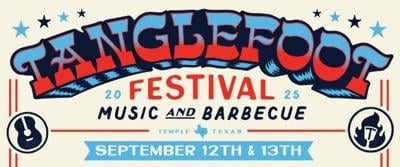The announcement of a destination music and barbecue festival planned for this fall in Temple and a spate of public criticism prompted a response from City Manager Brynn Myers.
Community comments in public forums online and in the newspaper have been critical, and some supportive, of the Tanglefoot Music & BBQ Festival set for Sept. 12-13 at the MLK Festival Grounds in downtown.
The city’s budget of more than $3 million for the event has some members of the community questioning whether city resources could be used for other needs in the city.
Myers on Tuesday discussed the event and offered her perspective on why the festival is a good idea for the community. She also shared insights on how Tanglefoot will be funded, and where the proceeds of the festival can be spent by the city.
Myers said while the overall budgeted amount is what the city expects to spend on the festival, those expenses would be directly covered by revenues from the event itself.
“While expenditures may reach $3 million, this is also a revenue-generating event,” Myers said. She explained that city officials are aware that because it is a first-year event, there is the possibility the festival could lose money. That loss, however, has been anticipated and city officials are watching the event budget very closely.
“We would be willing to spend a little bit more than we make the first year in order to establish the festival,” Myers explained. “The opportunity is for an economic investment in our community because that is a direct return on investment. The city can directly recover our expenses for talent, equipment rental and all of the things that go with the event.”
Another benefit for hosting an event such as Tanglefoot is that ultimately it supports local businesses and business development.
“The spin-off benefit for the festival, which is a significant reason that we would have the event in the first place, is to support businesses in our community by having people come to Temple and to draw people into our community who will spend money at local businesses and stay the night in our local hotels,” Myers said. “That generates revenue for those businesses, which in the end, is a benefit to the city as well.”
As Meyers explained, the funds for the festival are being directly covered through revenues from ticket sales or corporate sponsorships for the event. Any additional resources needed for the event would come from the city’s hotel and motel tax fund, for which there are specific set of guidelines as to how that money may be spent.
“By state law, this is a restricted source of revenue that can only be used for, as we like to call it, ‘putting heads in beds,’” Myers said. “That means that these funds come largely from hotel occupancy taxes when people stay in Temple, and legally, there is supposed to be a direct connection that money that is generated from those occupancy taxes to support developing more business for those hotels that generate that revenue.”
Hotel occupancy tax laws in Texas state that any hotel or motel tax revenues generated by municipalities must be utilized for initiatives such as promoting tourism, historical restoration or sponsoring arts and entertainment events.
While expenditures for Tanglefoot are being covered by its own revenue or through the hotel occupancy tax fund, any proceeds from the festival would have to be used toward those same types of initiatives.
“Because this is a restricted source of revenue, it cannot be used for things like hiring police officers or filling potholes. It has to be used for initiatives that directly generate more room nights in hotels,” Myers explained.
With these restrictions in mind, and when considering that event expenses would be covered by direct revenue and offset by indirect sales tax revenue, city officials believe it made sense for to move forward with the festival.
Myers said even though this is a first-year event, there is still the possibility that it will make money. Still, city officials intentionally remained conservative in their approach to the festival.
“In my mind, the whole purpose for the event is certainly to entertain, but also to draw people into our community to spend money with our local businesses,” Myers said. “Then, when those visitors spend money here, it generates sales tax revenue, which can be used for streets, more police officers or other city services.”



















